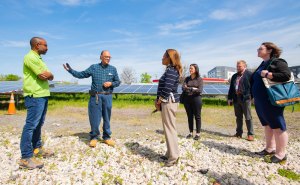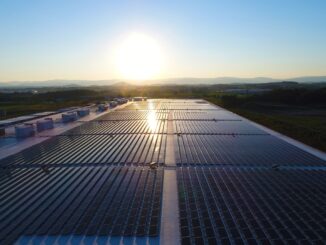
Despite setbacks, community solar advocates in Virginia remain upbeat that recent policy breakthroughs in neighboring Maryland and the District of Columbia will benefit their case in the next legislative session.
Virginia’s General Assembly this winter scrapped a measure designed to expand a 150 megawatt shared-solar pilot program in Dominion Energy territory and eliminate — or at least reconsider — a $55 monthly fee on subscribers who don’t qualify as low income.
“We’ll be back,” said Charlie Coggeshall, Mid-Atlantic regional director with the Coalition for Community Solar Access. “We do feel like shared solar is a bipartisan issue in the state. It’s complicated and requires a lot of education. That takes time.”
In the meantime, he is encouraged Dominion Energy has greenlighted 38 shared solar projects totaling 140 MW thus far. Operators are allowed to begin enrolling participants on July 1.
Still, that seems a tiny victory when compared to what’s unfolding across the Potomac River with a pair of shared solar early adopters.
Maryland Gov. Wes Moore, a Democrat, is scheduled to sign a bill into law today that replaces the state’s pilot program with one that is permanent, less restrictive and more equitable.
Sign up for Energy News Weekly
Get the most important energy news of the week delivered directly to your inbox.
Broadly, community programs allow utility customers to buy solar energy via subscriptions to shared, local arrays typically built and owned by third-party entities, not utilities. It’s an appealing arrangement for customers unable to afford the upfront expense of rooftop panels, residents with shaded southern exposure or subject to homeowner association restrictions, and renters without control of their rooftops.
Maryland introduced a shared solar pilot program in 2016 after passing initial legislation a decade ago. The pilot was set to expire at the end of next year.
The new program takes effect July 1 and eliminates an overall cap on its size. Any single project is capped at 5 MW, but they can be up to double that size if a developer encompasses brownfields, rooftops and industrial land or incorporates an agricultural angle. As well, 40% of each project’s capacity is reserved for low-income enrollees.
“Everything we asked for, we got,” Stephanie Johnson, executive director of the Mid-Atlantic-based Chesapeake Solar & Storage Association (CHESSA), said about the Maryland legislation.
Maryland’s program embraces consolidated billing, so a customer’s subscription fee is rolled into the monthly utility bill. It doesn’t include a minimum fee.
Coggeshall has noted that the concept of a minimum fee or bill associated with shared solar programs is “unique to Virginia. Generally speaking, it’s rare and not seen in other states.”
Community solar programs allow subscribers to earn credits in the form of savings on their monthly electric bills, while also helping the array developers pay down construction and operation costs.
Coggeshall’s coalition is eager for shared solar capacity nationwide to grow from its current 5 GW to 30 GW by 2030. Thus far, 22 states have enabled some sort of policy.
In the nation’s capital, utility regulators last month ordered Pepco to conduct an audit to resolve a long-running billing dispute between the city and Pepco over a successful shared solar program geared for low-income residents. In tandem, Pepco must reconcile all shared solar credits issued since May 8, 2015, the day D.C. regulations kicked in.
The D.C. Public Service Commission (PSC) stated that “Pepco is currently in violation or has been in violation of relevant laws and regulations” in several of the counts laid out in a joint complaint the city attorney general and the Office of the People’s Counsel filed against the utility in March 2022.
“It is encouraging to see the PSC take action,” Johnson said about the April 24 order. “I was surprised because in general you don’t see utilities called out and held to account.”
More than a year ago, the city alleged that Pepco has shortchanged low-income enrollees and the city by as much as $665,000 over the last couple of years. City officials claimed that “Pepco’s pattern of systemic violations” is weakening public confidence in community solar and causing financial harm, as well as compromising the District’s ability to meet stringent standards aimed at reducing greenhouse gas emissions.
Roughly 5,000 of the 6,800 households signed up for community solar citywide are enrolled in Solar for All, D.C.’s environmental justice program.
Pepco spokeswoman Addie Kauzlarich said the utility will work with all the stakeholders to conduct an audit of the community solar crediting. After those results are reviewed, she said, Pepco will address any discrepancies or billing issues.
Kauzlarich noted that the April order didn’t require Pepco to pay any fines and also “found that Pepco did not act in bad faith or in willful disregard to the law regarding claims.”
Even though Virginia lags behind on community solar, Johnson said she remains optimistic legislators will eventually honor the piece of Republican Gov. Glenn Youngkin’s Energy Plan that encourages “removing barriers to distributed generation, including shared solar.”
Coggeshall pointed out that Virginia should be poised to follow Maryland’s jump from pilot to permanent shared solar programs instead of “still being in this weird spot.”
Shared solar champion Sen. Scott Surovell helped get the original legislation passed in 2020 by reluctantly capping the program at 150 MW and including a measure that allowed state regulators to set a monthly minimum fee to account for Dominion’s costs of implementing the program.
At least 30% of enrollees must qualify as low-income and are exempt from the minimum fee. Meeting that bar would allow the program to expand to 200 MW.
Surovell, a Democrat representing a district near D.C., has always maintained that the fee had to be reasonable to attract customers seeking fairly priced renewable energy.
This year, he introduced Senate Bill 1266 to boost total capacity to 1 GW and to ask regulators to again review the minimum fee. It passed the Senate with a nine-vote margin but failed to advance out of committee in the House of Delegates.
“Shared solar was unfortunately caught in difficult dynamics between the House and Senate,” Johnson said about the update being stymied in February. “If not hampered by an arbitrary minimum bill, shared solar offers Virginians a competitive choice and an opportunity to lower energy costs.”
John Finnerty, director of business development for Standard Solar, figures Virginia’s appetite for clean energy will eventually sway the General Assembly, Dominion and utility regulators to drop the $55 minimum fee barrier. That might happen even as projects in the queue wend their way through a very lengthy permitting and interconnection procedure.
“Virginia is going to see a lot of other states having good success with community solar and they’ll jump on board,” Finnerty said. “Dominion was way ahead on utility solar, but it’s definitely behind on residential and community solar.”
Meanwhile, Standard Solar, based in Rockville, Maryland, is helping roughly a dozen of the shared solar projects in Dominion’s queue move forward by providing other developers with investment dollars and offering services such as subscriber management, and engineering and construction support.
As it stands now, projects proposed in Virginia would serve 100% low-income subscribers. Finnerty and other developers are hopeful that the 2022 federal Inflation Reduction Act will provide credits to make that financially viable.
That will become clearer once the American Clean Power Association sorts out the particulars of IRA guidance regulations that the U.S. Treasury Department released Friday.
Coggeshall and other advocates have every intent of backing a bipartisan shared solar bill next January.
The wild card surfaces this November when all 140 General Assembly seats are on the ballot in Virginia. Redistricting and key retirements could reshuffle the 22-18 edge Democrats have in the Senate and the 52-48 Republican majority in the House.
“The election is a big X factor for us,” Coggeshall said, adding that “the common denominator is Youngkin and that’s an important audience we want to continue to cultivate.”
Stay tuned, he advised.
“The results of the election won’t determine if we move forward, but how we do it.”



